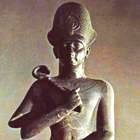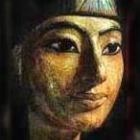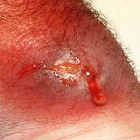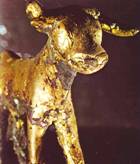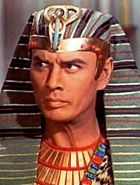Baby Moses saved from death
- Moses’ name appears to be Egyptian, as in Thutmoses (child of Thut); or it may simply mean ‘child of the water’. The Hebrew word mosheh also means ‘pulled out of’, as in pulled out of the water
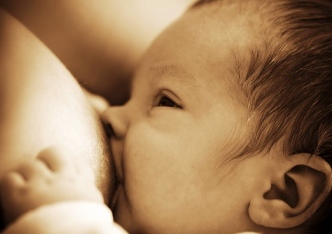 Miriam means ‘prophetess’ or ‘lady’, a title of respect. But for her, the story of Moses would never happened
Miriam means ‘prophetess’ or ‘lady’, a title of respect. But for her, the story of Moses would never happened- Shiprah and Puah, two midwives ordered by Pharaoh to smother or drown newborn Hebrew boys.
This story is the first recorded pogrom against the Jewish people.
The story of Moses has 6 episodes:
- Baby Moses is cast adrift in the waters of the Nile: Exodus 2:1-10
- The burning bush, God speaks to Moses: Exodus 2:23-4
- Moses and Pharaoh – Ten Plagues of Egypt: Exodus 5-12
- Wandering in the Desert, Crossing the Red Sea: Exodus 13-18
- The Ten Commandments, Exodus 20
- The Golden Calf, Exodus 32
What is Moses’ story about?
- One man, Moses, changed the history of the world.
- One extraordinary event changed the whole future of the Hebrew people.
How does the story begin? By chance or God’s intervention, a tiny baby was saved from drowning in the Nile, and this kick-started everything that followed.
This little baby grew up to be a charismatic leader of the Jewish tribes as they fled from slavery in Egypt. His stand against injustice and the power of the Egyptian Pharaoh would create a model for the future Jewish nation.
Moses is cast adrift in the Nile
The Bible tells the story of how the Egyptian Pharaoh wanted to limit the increasing numbers of Hebrews in the Egyptian population. He hit on a clever plan, he thought. He decreed that every new-born male baby should be thrown into the Nile River.
Who was this Pharaoh?
If Ramesses II was the Pharaoh who confronted the adult Moses, as many scholars believe, his father Seti I was the ruler who ordered the drowning of Hebrew boys (see a picture of the mummified body of Seti I at right).
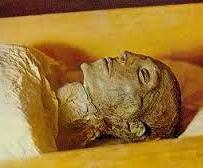
Mummified body of Seti I, Pharaoh of Egypt
Girl babies would be spared. The Pharaoh hoped they would marry Egyptian men, so that eventually Hebrew identity and culture would be suppressed and forgotten, and the Hebrews would integrate into the Egyptian population.
It was the first recorded pogrom of Jews.
There are several examples of pogroms in the Old Testament – this one, and the empire-wide pogrom in the Book of Esther. Anti-Semitism existed long before the beginning of Christianity.
Pharaoh’s command: murder all baby boys
To carry out his plan, Pharaoh told the Egyptian midwives, among them two women called Shiprah and Puah, to
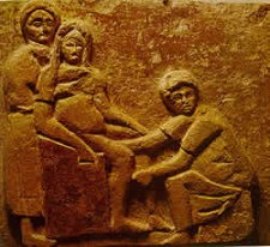
Two midwives assist a woman giving birth
smother all male babies as soon as they were born (midwives seem to have worked in pairs; you can read the story of these two crafty women at Top Ten Bible Heroines).
The women ignored Pharaoh’s command, and the Hebrew population continued to multiply.
So Pharaoh commanded that all Hebrew baby boys be drowned – the story is a forerunner of King Herod’s Massacre of the Innocents when Jesus was born.
When the baby boy Moses was born to his Hebrew mother he was a fine, strong little fellow. In fact, the Bible uses the same words to describe him as are used in the Creation story – ‘it was good’.
Moses’ mother successfully hid him until he was three months old. But people lived very closely together and it was impossible to hide him permanently from her neighbours. Sooner or later someone was bound to talk.
The baby in the basket
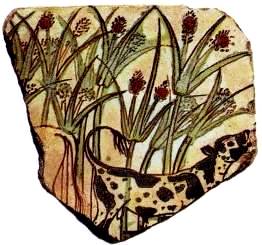
Papyrus reeds on the banks of the Nile: ancient faience circa 1350BC
So she and her daughter Miriam (this girl’s story is at Bible Women: Miriam) put him in a water-proof basket among the papyrus reeds at the edge of the Nile ( see the Egyptian papyrus reeds on ancient faience, circa 1350BC at right) and pushed him out into the water.
The basket was coated with bitumen and pitch, and papyrus leaves are water-repellent, so he was as safe as he could be in this situation. Now Moses was in God’s hands.
Moses found and saved
Miriam stayed at the water’s edge, unable to leave her little brother. In an ironical twist to the story, Pharaoh’s own daughter came down to the river to bathe herself – all the ancient writers comment on the cleanliness of the Egyptians.
She saw the basket, and heard a baby crying. She sent her maid to fetch it, and when she looked inside and saw the fat little boy, she was touched with pity for the tiny fellow. She knew immediately who he must be – one of the Hebrew’s children.
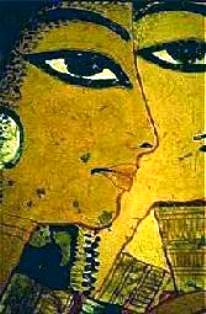
Ancient wall painting of Egyptian women
In an act of generosity, and perhaps defiance of her father, she decided to keep the baby. Her compassion contrasts sharply with her father’s ruthlessness.
Of course, the princess could not take him back to the palace. That would lead to his immediate death. What to do? At that moment Miriam stepped forward, and guilelessly asked if she could help, perhaps by arranging a wet nurse from among the Hebrew women? Pharaoh’s daughter agreed.
Now comes an ironic twist: the wet-nurse was his own mother, whose breasts were still heavy with milk. Little Moses was raised by her, and she was paid wages by Pharaoh’s daughter to look after him.
When he was grown, Pharaoh’s daughter adopted him as her own son, so that he was brought up with the best of everything.
Did the Pharaoh know about the deception, and decide to indulge his daughter? Or was he kept in the dark?
The author of Exodus is not interested in such detail. The essential point of the story is that, out of this improbable background, God was preparing a ‘go’el’ (deliverer) for His people, even making an Egyptian princess contribute to the child’s survival.
Who said there’s no humor in the Bible?
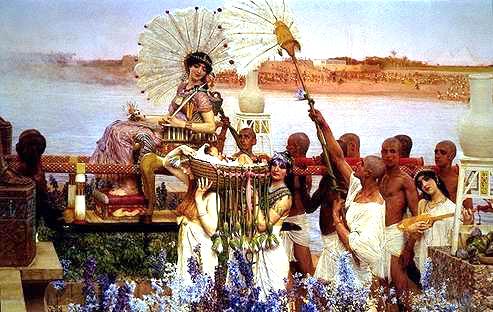
Pharaoh’s daughter discovers the baby Moses in the river Nile
Summary
- The Egyptian Pharaoh tried to limit the Hebrew population by drowning all male babies.
- But Moses’ desperate mother and loyal sister Miriam, helped by an Egyptian princess, saved the baby boy from the waters of the Nile.
- Moses would grow up to be the savior of his people.
Bible text for Moses’ story
Exodus 2:1-10
Now a man from the house of Levi went and married a Levite woman. The woman conceived and bore a son; and when she saw that he was a fine baby, she hid him for three months. When she could hide him no longer she got a papyrus basket for him, and plastered it with bitumen and pitch; she put the child in it and placed it among the reeds on the bank of the river. His sister stood at a distance, to see what would happen to him.
The daughter of Pharaoh came down to bathe at the river, while her attendants walked beside the river. She saw the basket among the reeds and sent her maid to bring it. When she open it, she saw the child. He was crying, and she took pity on him. “This must be one of the Hebrews’ children”, she said.
Then his sister said to Pharaoh’s daughter “Shall I go and get you a nurse from the Hebrew women to nurse the child for you?” Pharaoh’s daughter said to her “Yes.” So the girl went and called the child’s mother. Pharaoh’s daughter said to her “Take this child and nurse it for me, and I will give you your wages.”
So the woman took the child and nursed it. When the child grew up, she brought him to Pharoah’s daughter, and she took him as her son. She named him Moses, “because” she said “I drew him out of the water.”
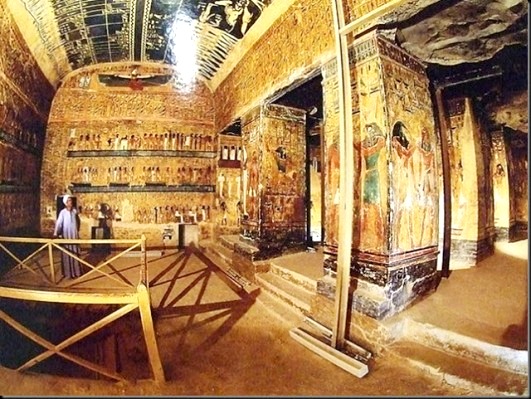
Interior of the tomb of Pharaoh Seti I, who may have been Pharaoh at the time Moses was born
Bible Study Activities
Something to think about
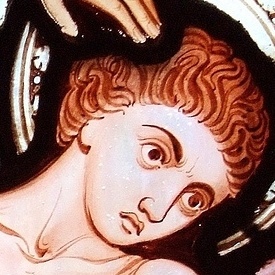 You can destroy a child in more ways than one: by teaching it bad habits, by letting it get away with too much, by failing to give it the example you should. Here are two questions:
You can destroy a child in more ways than one: by teaching it bad habits, by letting it get away with too much, by failing to give it the example you should. Here are two questions:
- Were you spiritually/emotionally damaged or destroyed in any way when you were a child? How?
- In what ways have you damaged or destroyed young people around you? Think about that one…
Remember the story of the baby elephant, chained to a small post in the ground. Because it is a baby, it cannot pull the chain and dislodge the post. It accepts that this is the way things are. But it grows and grows until it is, well, as big as an elephant.
As an adult, it could easily pull out the post, but it never does. It holds on to what happened in the past, staying chained forever.
Don’t be like the elephant. Put bad things behind you.
An ethical question
- Should Pharaoh’s daughter have disobeyed her father by saving Moses?
- When is it right to ignore rules?
Think of some concrete examples where rules might be ignored.
Helping Someone – Maybe Yourself
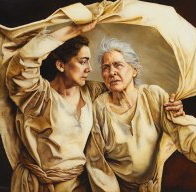 Acting together, the five women in the story saved and nurtured the baby Moses.
Acting together, the five women in the story saved and nurtured the baby Moses.
- What have you done lately to help someone in trouble?
- What have you done lately to save and nurture yourself?
© Copyright 2006
Elizabeth Fletcher



